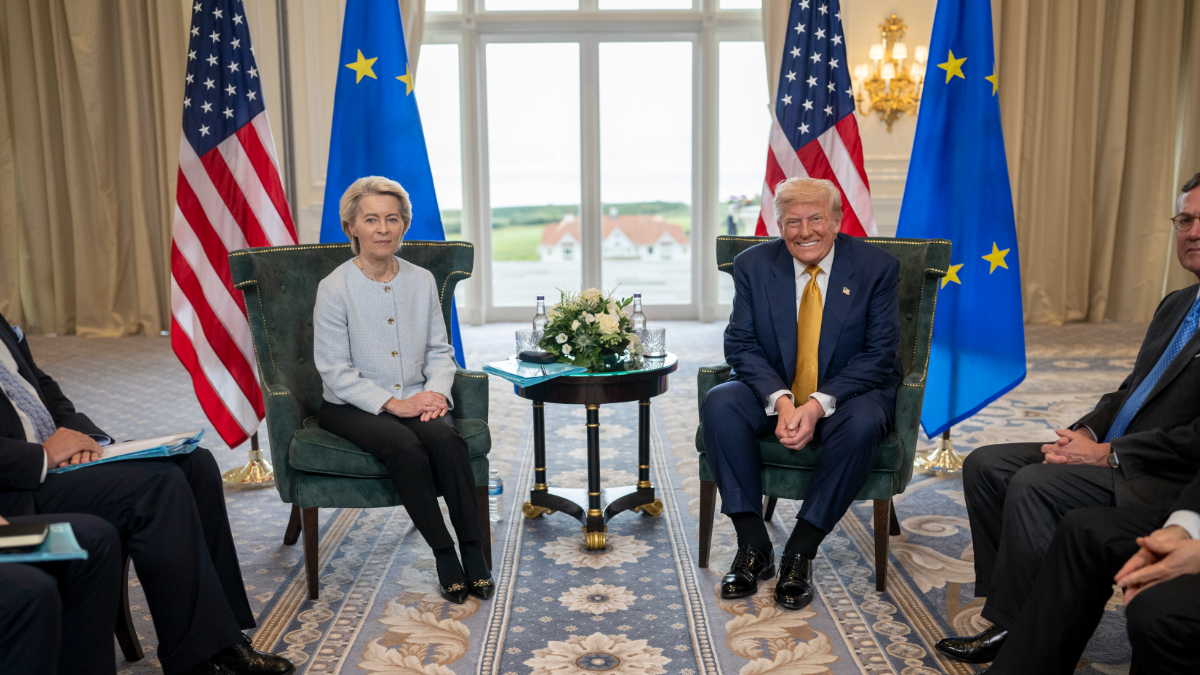Trump Squares Off with Brussels Over its Digital Rulebook
Mark Scott / Aug 28, 2025Mark Scott is a contributing editor at Tech Policy Press.

US President Donald J. Trump participates in a Bilateral with the President of the European Commission Ursula von der Leyen at the Trump Turnberry golf course in Turnberry, Scotland, Friday, July 27, 2025. (Official White House photo by Daniel Torok)
Just when the European Union thought it was out, United States President Donald Trump pulled it back into a transatlantic dispute over regulating Big Tech.
Only days after the EU and the US published details of a newly-minted trade agreement, the US president railed against countries — without specifically naming the 27-country bloc — that had enacted digital rules targeting some of Silicon Valley’s biggest names.
“I put all countries with digital taxes, legislation, rules, or regulations on notice,” Trump wrote on social media. “Unless these discriminatory actions are removed, I, as President of the United States, will impose substantial additional tariffs on that country’s exports to the USA.”
In response, the European Commission — the EU’s executive branch that has oversight of both the transatlantic trade agreement and the bloc’s digital rules — said it would still implement the EU-US deal, which imposed a 15 percent tariff on most European goods entering the US.
But a Commission spokesman said the bloc’s digital rules had never been part of those discussions with Washington.
“It is the sovereign right of the EU and its member states to regulate economic activities within our territories, which are consistent with our democratic values,” she added.
In this Godfather-esque stand-off, it’s now an open question whether Brussels and Washington will go to the mattresses over the right to police the likes of Meta, Google and Amazon.
Trump’s latest broadside against the EU’s Digital Services Act (DSA) and Digital Markets Act (DMA), as well as the litany of European national digital services taxes, marks a ratcheting up of pressure from the US, where consecutive White House administrations have criticized Brussels’ alleged targeting of some of America’s largest firms.
In a separate move, the Trump administration is reported to be considering visa restrictions on EU officials implementing these digital rules. The US State Department has instructed its officials across the bloc to argue for changes in the legislation that impose at least a 6 percent fine on companies’ annual revenue for potential wrongdoing.
Both Republican and Democratic politicians claim the bloc’s online safety and digital antitrust rules impose so-called non-tariff barriers to how the likes of Alphabet and Apple operate within the EU. Washington has long accused Brussels of giving smaller European companies an unfair advantage when serving up their digital wares to 450 million citizens.
The EU has repeatedly rebuffed those claims.
For over a decade, the bloc has investigated Big Tech firms for potential competition abuse, imposing hefty fines on the likes of Google, Meta and Apple for using their dominant market positions to favor their own services over those of rivals. The companies appealed those allegations, which mirror separate lawsuits filed by the US Department of Justice and Federal Trade Commission.
In 2024, the EU extended its digital rulebook to include online safety requirements for social media platforms and search engines, as well as newly-created oversight of artificial intelligence systems that will be rolled out over the next 18 months. It has open investigations into potential wrongdoing for both American and Chinese companies.
EU officials say these efforts are aimed at protecting the bloc’s citizens from illegal content like terrorist material and counterfeit goods, as well as ensuring the AI revolution does not breach people’s fundamental rights. The Trump administration believes the bloc’s online safety rules represent an unfair restriction on US citizens’ First Amendment rights.
Trump’s threat to impose retaliatory tariffs on countries with digital regulation — including those within the EU — is likely to run into two uncomfortable truths.
For one, the US finds itself with an annual trade surplus of $88.6 billion with the EU when it comes to services, of which those from the tech industry represent a sizable portion. That contrasts to a $235.9 billion trade deficit for the US in goods from the EU, according to figures from 2024, the latest full-year available.
That imbalance allowed the Trump administration to play hardball during the recent trade negotiations, which exclusively focused on the current transatlantic trade in goods. It’s harder to impose retaliatory tariffs on services — to support Big Tech — when the US is currently a net winner in that trading relationship with the EU.
For another, there are few advocates for Big Tech within the 27-country bloc that can curry favor in whatever negotiations arise between the European Commission and the Trump administration.
In the recent EU-US trade talks, several EU member countries lobbied hard for their goods to receive exemptions from potential hefty American tariffs. That weakened Brussels’ negotiating position as it sought to play referee between different European countries with one-off requests for national industries to be spared the worst of US levies.
When it comes to tech, such internal squabbling doesn’t exist — with the potential exception of Ireland and Luxembourg, which are home to many of the European headquarters for Big Tech giants, mostly because of these countries’ low-tax regimes.
There are few within Europe willing to spend political capital to protect American tech firms that, while immensely popular within the bloc, do not have the same national political and economic supporters lobbying for the EU to take a hard line against Silicon Valley. That includes European companies like those from the publishing and telecommunications sectors that have lost out financially to US tech firms.
With some American tech firms pivoting hard to embrace Trump’s “Make America Great Again” agenda, the decades of goodwill these companies had built up overseas — in the form of helping hundreds of countries to protect their elections from potential digital interference and supporting local firms to fell their goods on these platforms — have evaporated almost overnight.
In an era of cash-strapped national budgets, EU member countries also look enviously at the profits American tech firms generate from their citizens, and wonder: ‘why shouldn’t we take a slice of that tax income via domestic digital services taxes?’
Those tax-raising efforts had been postponed amid a push to set a global standard via the Organization for Economic Cooperation and Development.
But now that the Trump administration has pulled out of that multinational agreement, which would have led to significant additional tax receipts for Washington, EU countries are revving up their tax-collecting engines, and have their eyes set on Big Tech.
In Brussels, it is an open secret that Ursula von der Leyen, the European Commission president, is less enamored with Europe’s digital rulebook than she once was during her first term as head of the EU’s executive branch.
Her focus has shifted to a deregulatory agenda to jumpstart economic growth by implementing suggestions from a 2024 competitiveness report written by Mario Draghi, the former head of the European Central Bank.
But that regulatory pull-back does not equate to a willingness from the EU to negotiate away its online safety and digital antitrust legislation — at least not yet. Such flagship regulation lies at the heart of Europe’s so-called “Third Way,” between the US’ hands-off approach to tech and China’s authoritarian control of the digital world, that has been embraced across the 27-country bloc.
Brussels’ commitment to its digital rules may still not stop the Trump administration from pursuing a new round of retaliatory tariffs, especially when the European Commission announces its enforcement decision against X under the bloc’s DSA. That announcement may come as soon as September.
For many in Washington, the threat of further tariffs may represent an offer the EU can’t refuse when negotiating potential changes to its tech legislation.
But for those in Brussels, the bloc’s digital regulation currently remains off-limits in international trade talks — no matter the warnings from long-standing allies.
Authors
